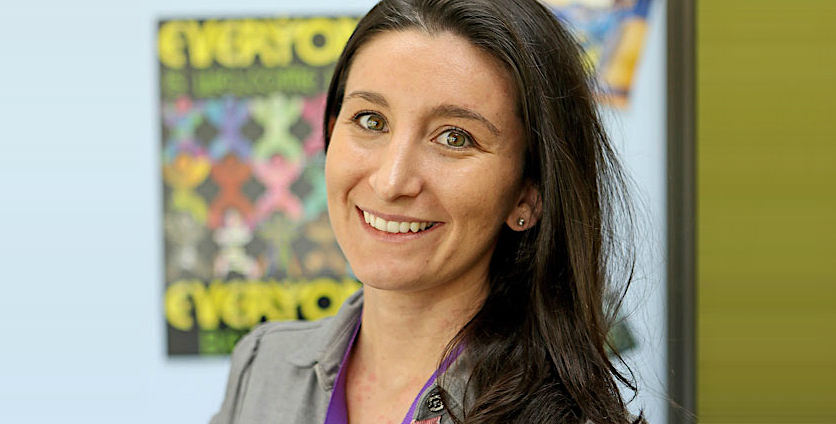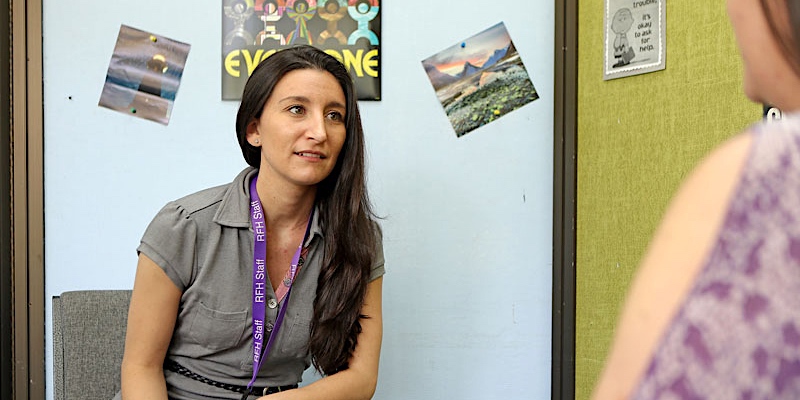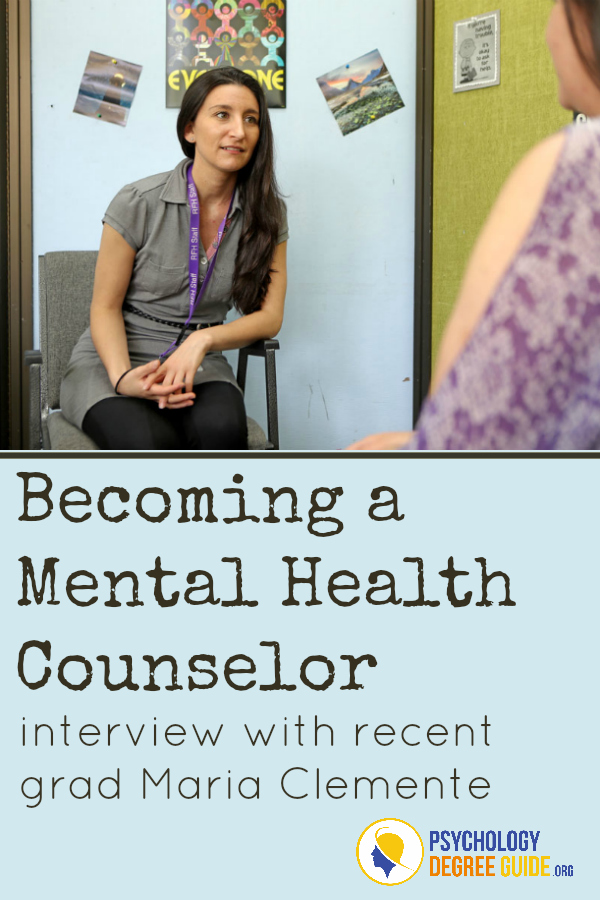Interview with Monmouth University Mental Health Counseling Graduate Maria Clemente
- June 9, 2017
- Posted by: Administrator
- Category: Student Interviews,

Photo: Maria Clemente, a recent Monmouth University Master’s graduate in Clinical Mental Health Counseling, is pictured at Rumson-Fair Haven Regional High School where she worked in the wellness room during one of her field placement internships. Monmouth University © 2017. All rights reserved.
Maria Clemente is a recent graduate of the Master’s in Mental Health Counseling program at Monmouth University. With an added Student Assistance Coordinator endorsement, Maria plans to bring her skills to the school setting where she can work with students regarding their emotional, behavioral, and psychological challenges.
PsychologyDegreeGuide.org: Thanks for agreeing to do an interview with Psychology Degree Guide, Maria. Can you tell us a little about yourself and why you chose to pursue a degree in Clinical Mental Health Counseling?
Maria Clemente: I went to Towson University for my undergraduate degree where I studied Psychology with a track in Pre-Medicine. Throughout my undergraduate studies, I developed an enthusiasm for psychology and learning about the human brain, in relation to our emotional, behavioral, and mental development. Recently, I just graduated (May 2017) with my Master’s degree in Clinical Mental Health Counseling from Monmouth University. I will soon be a licensed associate counselor, which will allow me to work as a mental health clinician under supervision. I also pursued my Student Assistance Counselor endorsement and a specialization in alcohol and drug counseling.
When I decided to go back to school for my master’s, I chose to follow a clinical counseling path because I wanted a degree that would allow me to graduate and begin working independently with clients. Pursuing a degree in clinical mental health counseling would allow me to achieve that, in addition to giving me the opportunity to touch so many peoples’ lives in a deep and meaningful way. Mental health counseling seemed like a perfect fit for what I wanted to achieve throughout my career.
PDG: What appealed to you most about the program at Monmouth University?
MC: The program at Monmouth University appealed to me for several reasons. One of the most prominent reasons was the incredibly accomplished faculty who teach in the program. Each professor brings their own unique experiences and specialties to the table and has been very established in the field. Their willingness and enthusiasm to create a strong counseling foundation for the students is apparent as soon as you meet them in your first class. Their knowledge and reach throughout Monmouth County and NJ, is unmatched.
Another factor that drew me to the program was the fact that it is CACREP accredited. CACREP is the accreditation body for counseling programs, and Monmouth University’s program was the first in the state to be accredited. Having this accreditation contributes to the level of rigor and prestige in the program that is helpful as you graduate and enter the field.

Photo: Maria Clemente, a recent Monmouth University Master’s graduate in Clinical Mental Health Counseling, is pictured at Rumson-Fair Haven Regional High School where she worked in the wellness room during one of her field placement internships. Monmouth University © 2017. All rights reserved.
PDG: I see that the Monmouth program offers many options for field placements where students can earn hands-on experience. Where were you placed for your internship?
MC: The internship experience is the part of the program where I grew my clinical skills the most. Through the guidance from my professors and the immersive experiences while on-site at my internships, my interest and scope of knowledge about the counseling field has grown tremendously. Monmouth’s program does offer a large number of field placement sites for their students. Part of that comes from the strong relationships the professors have with different sites, and part of it comes from the preparedness in the students that is apparent when they begin their field placement.
Personally, I interned at two different field placement sites. The first was at a private practice called Integrated Care Concepts & Consultation. My second was working with the Student Assistance Coordinator at Rumson-Fair Haven High School. I was very fortunate in both of my experiences to have engaged supervisors who were focused on my growth as a new clinician. Finding a site where you feel challenged and supported is extremely important. You want to be pushed a little out of your comfort zone because that’s where you will learn the most, while still feeling secure that you have a supervisor who is available and willing to help.
Sponsored School(s)
PDG: What are your plans for your future? What are your professional goals?
MC: As a new graduate, my plans for the future are always on my mind. I have been applying to a variety of jobs, as the degree is versatile in that way. It really allows you to go on to pursue whatever specialization area you feel most enthusiastic about. Throughout my graduate school journey, I developed a particular interest in the life experiences of adolescents and young adults. This is a large part of the reason I took the classes to earn my Student Assistance Coordinator endorsement because this allows me to work within schools in a mental health counseling capacity. With that being said, many of the jobs I am currently applying to are in school districts. I would love the opportunity to work with students regarding their emotional, behavioral, and psychological challenges. I think this is some of the most influential work that can be done with today’s youth. Long term, I see myself in a private practice. I love the idea of managing my own practice while still being clinically oriented.

PDG: Do you have any advice for students who are thinking about getting into this field?
MC: For anyone who is considering the counseling profession, I would highly encourage him or her to look into Monmouth’s program. The idea of starting your graduate school journey can be a daunting one. I remember feeling concerned about the time and financial commitment. Looking back on the 3 years I have been at Monmouth, I can confidently say it was well worth the time and money. Being a student in this program has been one of the most fulfilling experiences in my life thus far. If I could tell prospective students one thing, it would be to dive head first into the experiences this program has to offer. The experience you gain here will last you a lifetime.








